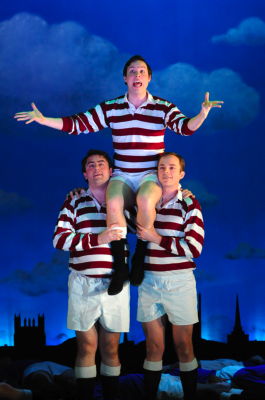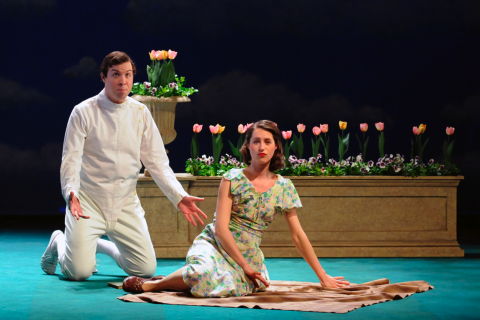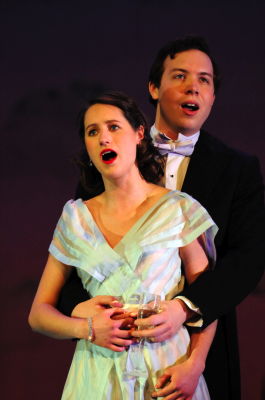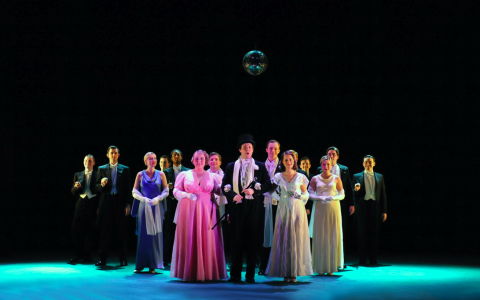|

Quite a Charmer
'Alessandro' at the London Handel Festival,
reviewed by ROBERT HUGILL
Our lack of background details to Handel's composing process is frequently frustrating. In a work like his opera Alessandro we can clearly discern the changes which he and his librettist, Paolo Rolli, wrought on their original sources. But we have no idea why, we can only guess. Alessandro (Alexander the Great) was chosen as the first work to be performed by the Royal Academy's new trilogy of stars, castrato Senesino and sopranos Faustina Bordone and Francesca Cuzzone. Our view of the work is coloured by the subsequent rivalry between the two sopranos, and many commentators speculate that Handel's changes were 'forced' upon him by the singers. But in no other work written for the starry trilogy did Handel produce such a perfect balance between the two soprano roles. In the programme book for the performances of the opera at the Britten Theatre by the London Handel Festival (seen 30 March 2009), Suzana Ograjensek speculates that Handel may have in fact relished the changes in order to show off his own skill at writing for such a spectacular trio of performers.
These changes are important because not only did Handel and Rolli increase scope of the soprano roles, but they reduced the amount of time given to the conspiracy against Alessandro. As a result, the conspiracy ceases to function properly as a coherent sub-plot. The libretto for Alessandro was based on a libretto for an opera by Agostino Steffani and in this, the conspiracy is a genuine thread running throughout the whole opera. In Handel and Rolli's Alessandro we simply get a group of minor episodes which don't entirely make sense. Well, they don't make sense if we expect a coherent sub-plot, but if Handel was simply trying to show off Sensesino's myriad talents, then Alessandro works pretty well. The problem, as ever with opera seria, is our perception. We should be careful of complaining that the work does not make sense, when what we mean is that it does not make sense to our 21st century perceptions. It made a great deal of sense to Handel and his contemporaries and directors need to find a way of making the opera work today.
Director William Relton and designer Cordelia Chisholm had the additional task of creating a production which worked on the relatively small stage of the Britten Theatre and within what was presumably a relatively economical budget. Handel and Rolli set them a further problem, the opening scene of the opera featured a spectacular coup de théâtre involving Alessandro (Christopher Lowery) besieging a city. The main elements of the plot take place in the aftermath of this successful action, where plots by his officers and the subject nation are threaded through a romantic plot where Alessandro equivocates between the two women whom he loves: Rosanne (Susanna Hurrell) and Lisaure (Sarah-Jane Brandon).
Given the relative youth of the cast, Relton and Chisholm decided to transpose the action to 1930s Oxbridge with the siege being replaced by a Rugby match. This gave Chisholm scope for a series of simple but effective outdoor scenes where the protagonists disported themselves in typical Oxbridge fashion. All well and good; given the enthusiasm and talent of the cast this could have worked in a reasonable way. Granted, this relocation meant that the thanksgiving scene in the temple was turned into some sort of bizarre midnight ritual. By and large the re-location was made to work, but the main loss was that instead of war and dynastic issues, the opera was reduced to dealing with the loves and rivalries of a group of rich and posh graduates -- a sort of Alessandro in Brideshead.

Christopher Lowery (being carried) in Handel's 'Alessandro' at London's Royal College of Music. Photo © 2009 Chris Christodoulou
|
All might still have been well. After all it is not really what a Handelian opera seria looks like that counts, but how you stage it, and how sympathetic you are to the structure of the piece and the requirements of Handel's music. As far as William Relton seems to be concerned, the answer is not very much.
Relton's maxim in this production seems to have been to keep the audience entertained; something was happening on stage all the time. This was a very prop-heavy production so in addition to the antics of the cast, we had a coming and going of props on stage. Much use was made of the drop curtain and it must be said that the production flowed beautifully. But we had far too much activity.
The settings themselves were varied and rather over developed, so that there was a Rugby scene or two, a Rugby club dinner, Alessandro in the shower, Rosanna taking refuge in the toilet, tea drinking and cake eating, croquet, an exam and an all dancing all singing finale to Act 1. And within these scenes, there was constant activity; the singers were encouraged to always be doing something. In fact, if you had watched this without sound you might not have realised it was opera at all.
But opera seria does not lend itself to naturalism: you need to make room for the music and give it time to breathe. And this Relton did not do. Handel was a very fine dramatist. But, despite a talented cast, an experience conductor and a superb ensemble in the pit, Relton never allowed Handel to speak on his own; he was always accompanied by distracting business. Much of this business was amusing. Alessandro is not a comic opera by any stretch of the imagination, but there were times when Relton made it so.
Luckily we were blessed with a cast of fine young Handelians and the performances were always musical and well worth listening to. If push came to shove you could simply close your eyes and listen!

Christopher Lowery and Susana Hurrell in Handel's 'Alessandro' at London's Royal College of Music. Photo © 2009 Chris Christodoulou
|
In the title role, Christopher Lowery had the advantage of immense charm; you could understand why he had two women running after him. Lowery has quite a soft grained voice, one which was ideal for the more lyrical moments. But he lacked the ability to generate the trumpet tones which the more martial numbers required. His opening number was thus a little disappointing. But he seemed to generate a head of steam as the evening progressed and his later martial arias were sung with admirably firm tone.
As his beloved Rosanne, the one whom he chose in the end, Susanna Hurrell was both admirable and charming. Like Lowery she took a little time to warm up but by the second act she delivered some beautiful and technically adept singing. Hurrell was well balanced by Sarah-Jane Brandon as Lisaure. Brandon had the more dramatic part, as Lisaure was frequently racked by jealously. At first, neither singer seemed to be able to use the more complex passagework expressively, though both were technically competent. But as they warmed up, both Hurrell and Brandon showed that they could use even Handel's elaborate fioriture for expressive purposes, an essential requirement in this repertoire. Whilst Hurrell was, rightly, the essence of niceness as Rosanne, there were moments when I could have wished that Brandon was simply more vividly vituperative; she seemed to be a little constrained by her delicate 1930s persona.
Brandon is quite a big woman and Relton used her figure for unnecessary comic purposes. I suspect that her voice will develop and that Handel and Mozart will not remain central to her repertoire for long.
Ben Williamson played Tassile. His main role was to spend the entire opera mooning after Lisaure so that he could get her in the end; this is opera seria so everything has to tie up nicely at the finale. Williamson also has a soft-grained voice, but this fitted his musical character well. Williamson turned in some beautifully crafted and finely shaped singing. He also had a rather appealing, puppy-dog sort of character which worked well in the circumstances.
Baritone James Oldfield played Clito who was the leader of the rebellion. Oldfield gave a creditable rather than superb performance, but he is a talented singer, with an already wide operatic range. In order for Clito's rebellion to make more sense, Relton introduced some dumb-show during the overture in which Alessandro and Clito canoodled, thus indicating that Clito was in love with Alessandro as well. This was presumably meant to make more dramatic sense of Clito's rebellion, but I'm afraid that it didn't help the dramaturgy. And, in fact, we spent most of the opera wondering how this related to the rest of the opera. (Answer: it didn't really, despite more dumb show at the end.)

Christopher Lowery and Susana Hurrell in Handel's 'Alessandro' at London's Royal College of Music. Photo © 2009 Chris Christodoulou
|
Rosie Aldridge played Cleon, one of Alessandro's captains. Aldridge only had one aria but in this she showed herself to be one of the most gifted Handelians on the stage. Her range stretches from Monteverdi to Sondheim's Into the Woods, but I would love to see her in more Handel. I suspect that naturally Aldridge does not look particularly masculine, but her demeanour on stage meant that she created a believable masculine persona which is no mean feat.
John McMunn provided admirable support as Leonato, another of Alessandro's captains.
For the finale to the opera, Handel produced another coup, this time a musical one. The three leading roles are held back in the early part of Act III so that at the end Handel can use them in a sequence of duets and trios. First Rosana and Lisaure duet, then Alessandro has a duet with each of his leading ladies and finally all three join in a trio. As a sequence, it must have dazzled Handel's original audience and Lowery, Hurrell and Brandon ensured that the music worked the same magical effect on us.
As this was a production based in a music college we had a chorus rather bigger than that anticipated by Handel. They entered in to the spirit of the production with a will and managed to field two creditable (mixed) Rugby teams.
The London Handel Festival orchestra was in the pit, conducted by Laurence Cummings. The orchestra provided fine support and relished the solo moments that Handel gave them. Cummings paced the opera beautifully, creating the space in Handel's music which the staging lacked, but ensuring that things still flowed naturally.

The Act I finale of Handel's 'Alessandro' - Sarah-Jane Brandon, Christopher Lowery and Susanna Hurrell with chorus behind. Photo © 2009 Chris Christodoulou
|
Judging by the summary of the opera in Winton Dean's book on Handel's opera seria from this period, the opera was cut slightly. But as the cuts mainly seemed to involve Alessandro's further havering between his two lovers, I don't think any serious violence was done.
It was a delight to encounter this rather neglected Handel opera. Whilst none of the numbers has quite the 'wow' factor of Handel's best, there was much to enjoy from a musical point of view. In a more sympathetic production it would seem to have potential for being quite a charmer, and we were lucky to have a young and talented cast to make the most of Handel's music.
Copyright © 2 April 2009
Robert Hugill,
London UK

| 
